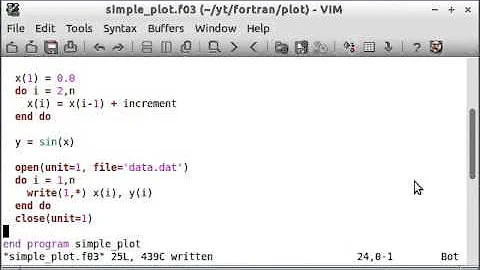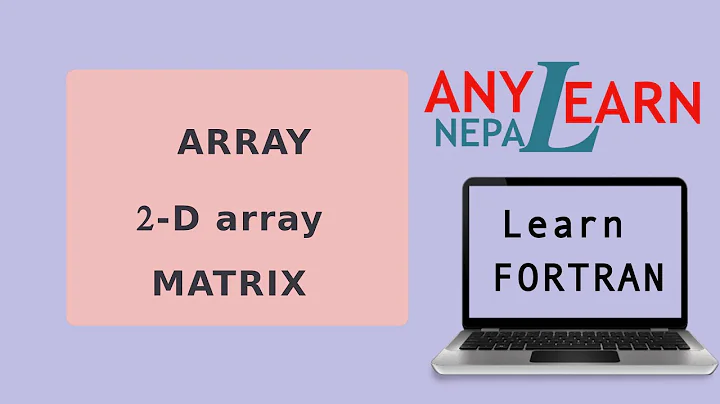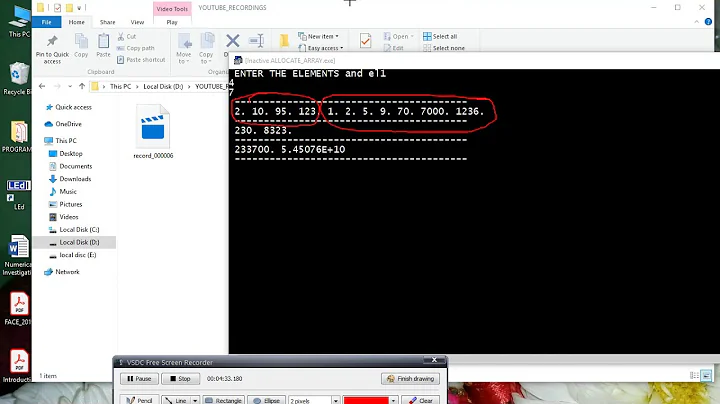generate a sequence array in fortran
17,843
Solution 1
No, there isn't.
You can, however, initialize an array with a constructor that does the same thing,
program arraycons
implicit none
integer :: i
real :: a(10) = (/(i, i=2,20, 2)/)
print *, a
end program arraycons
Solution 2
If you need to support floats, here is a Fortran subroutine similar to linspace in NumPy and MATLAB.
! Generates evenly spaced numbers from `from` to `to` (inclusive).
!
! Inputs:
! -------
!
! from, to : the lower and upper boundaries of the numbers to generate
!
! Outputs:
! -------
!
! array : Array of evenly spaced numbers
!
subroutine linspace(from, to, array)
real(dp), intent(in) :: from, to
real(dp), intent(out) :: array(:)
real(dp) :: range
integer :: n, i
n = size(array)
range = to - from
if (n == 0) return
if (n == 1) then
array(1) = from
return
end if
do i=1, n
array(i) = from + range * (i - 1) / (n - 1)
end do
end subroutine
Usage:
real(dp) :: array(5)
call linspace(from=0._dp, to=1._dp, array=array)
Outputs the array
[0., 0.25, 0.5, 0.75, 1.]
Here dp is
integer, parameter :: dp = selected_real_kind(p = 15, r = 307) ! Double precision
Solution 3
It is possible to create a function that reproduces precisely the functionality of range in python:
module mod_python_utils
contains
pure function range(n1,n2,dn_)
integer, intent(in) :: n1,n2
integer, optional, intent(in) :: dn_
integer, allocatable :: range(:)
integer ::dn
dn=1; if(present(dn_))dn=dn_
if(dn<=0)then
allocate(range(0))
else
allocate(range(1+(n2-n1)/dn))
range=[(i,i=n1,n2,dn)]
endif
end function range
end module mod_python_utils
program testRange
use mod_python_utils
implicit none
integer, allocatable :: v(:)
v=range(51,70)
print"(*(i0,x))",v
v=range(-3,30,2)
print"(*(i0,x))",v
print"(*(i0,x))",range(1,100,3)
print"(*(i0,x))",range(1,100,-3)
end program testRange
The output of the above is
51 52 53 54 55 56 57 58 59 60 61 62 63 64 65 66 67 68 69 70
-3 -1 1 3 5 7 9 11 13 15 17 19 21 23 25 27 29
1 4 7 10 13 16 19 22 25 28 31 34 37 40 43 46 49 52 55 58 61 64 67 70 73 76 79 82 85 88 91 94 97 100
Notice that :
- the last line is empty: Fortran treats graciously zero-length arrays.
- allocated variables get automatically deallocated once out of scope.
Related videos on Youtube
Author by
Stefano Borini
Updated on January 22, 2021Comments
-
Stefano Borini about 3 years
Is there an intrinsic in Fortran that generates an array containing a sequence of numbers from a to b, similar to python's
range()>>> range(1,5) [1, 2, 3, 4] >>> range(6,10) [6, 7, 8, 9]?
-
darjab over 13 yearsIsn't that the same as in range() above? I don't see the difference (well, apart from the <= and <, and the fact that fortran isn't a dynamic language). Maybe I understood the question wrong (or the answer).
-
janneb over 13 years@Rook: It's an array constructor with an implied do loop, not an intrinsic.
-
darjab over 13 yearsA-ah, yes. I completely missed that part in the question.
-
 CJB over 7 years@janneb thank you. Would you mind explaining which each argument to the constructor does? Am I right in thinking that this gives 2, 4, ... , 20? And is this more efficient than an explicit
CJB over 7 years@janneb thank you. Would you mind explaining which each argument to the constructor does? Am I right in thinking that this gives 2, 4, ... , 20? And is this more efficient than an explicitDOloop, or is it equivalent? -
 Vladimir F Героям слава over 6 yearsIt is similar to a Python list comprehension.
Vladimir F Героям слава over 6 yearsIt is similar to a Python list comprehension. -
Takeshi almost 6 yearsThis is truly list comprehension magic! I can even call a function in the constructor. OMG I'm gonna use this more often. Thank you so much!




![[Fortran Tuto 9] Dimension Arrays](https://i.ytimg.com/vi/dvMnZEt8maE/hq720.jpg?sqp=-oaymwEcCNAFEJQDSFXyq4qpAw4IARUAAIhCGAFwAcABBg==&rs=AOn4CLDZNC--qsnke8wClGXHHVmW8WM9yg)



